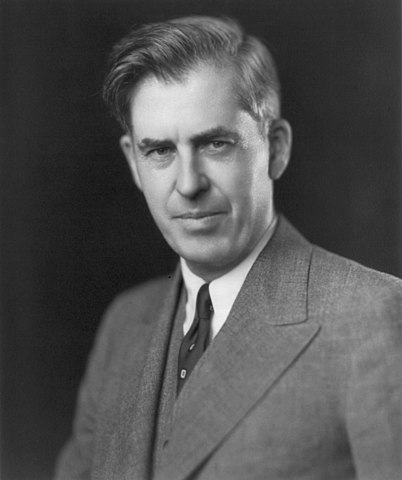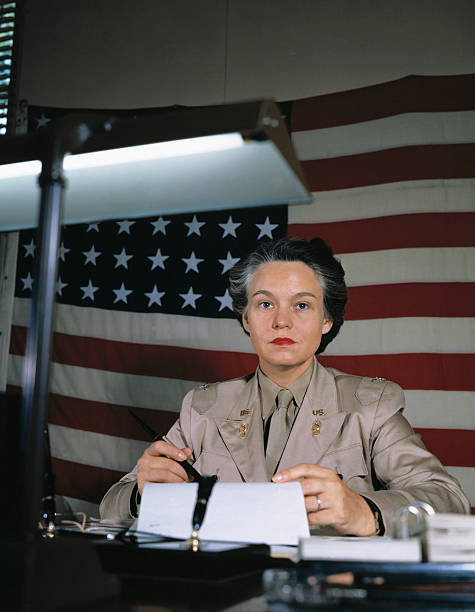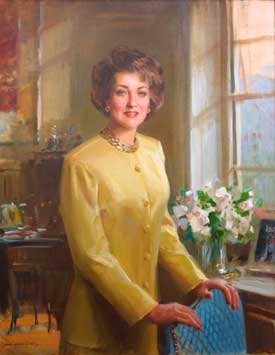
Henry A. Wallace
33rd President of the United States (April 12, 1945 – January 20, 1949)
Henry A. Wallace's tenure began on April 12, 1945, after the death of Franklin Delano Roosevelt after serving more than four years as the US vice president. After four years of serving in the White House, he stepped down from re-election attempts, allowing a Democratic-Republican Coalition to form under a war hero, General Dwight David Eisenhower. Wallace's Presidency is often seen as a turning point in US foreign relations - after the end of World War II, he campaigned on the end of US isolationism, making the American country an Arsenal of Democracy, supporting capitalist countries all over the world in a fight against communism. During the first months of his Presidency, Wallace authorized the nuclear bombing of Festung Munich, wiping out Hitler's government and forcing Wehrmacht's surrender across Germany and occupied territories. Similar operations in Japan (Hiroshima - August 6, Kokura - August 9, and Kyoto - August 18) caused a month-long Japanese Crisis that ended World War II in the Pacific Area. In the aftermath of World War II, Wallace was one of the Big Three that decided the postwar reality - together with Clement Attlee and Joseph Stalin they agreed on a denazification of the postwar Germany and its allied countries (Austria, Hungary, Romania, Yugoslav breakaway countries, France, Bulgaria and Finland). As a President, Wallace maintained strong links with anti-colonial groups, recognizing Israel, Vietnam, Syria, and other countries wishing to break from their colonizer nations.
Henry Wallace's relations with European countries are mixed. Soon after the European armistice, the Free French forces were sent to occupy the French-speaking Italian border region of Val d'Aoste - where American troops were present. Disagreement between American and French commanders resulted in the French forces opening fire on Americans - an action met with the harsh resolve escalating in the US conducting an air strike against the French artillery positions - a series of events now called by historians as the Aostan Crisis. On July 28, 1945, Wallace ordered the immediate end of all arms shipments to France. By August, he pushed through the idea of enforcing the Allied Military Government of Occupied Territories - using the pretext that Vichy France allowed military access to southern railroads during the German-led Fall Blau - 1941 invasion of Republican Spain. During the Levant Crisis, American military commanders took over the decolonization process in Syria after stopping the clash between the French Army of the Levant and the British Ninth Army. By September 2, 1945, the US was the first country to recognize the independence of Vietnam. During the 1948 election campaign, Republicans blamed Wallace for allowing the expansion of communism - recognition of anti-colonialist governments, inadequate support for Chiang's government that led to Mao's regime taking over mainland China, and US support to Spanish and Yugoslavian governments.
Domestically, Wallace's legacy is also mixed - the 80th Congress overridden his veto, forcing him to adopt the Taft-Hartley Act reversing some of the pro-labor union legislation enacted as part of New Deal programs. Wallace strongly supported war veterans' rights, integrating the Women's Army Corps, United States Naval Reserve (Women's Reserve), United States Marine Corps Women's Reserve, and United States Coast Guard (USCG) Women's Reserve as parts of the US Armed Forces. Wallace desegregated the military forces based on race and fought for the end of racial discrimination for the G.I. Bill, triggering the Democratic split in 1948 between the mainstream Democratic Party and the States' Rights Democratic Party. Revelations about Wallace's past contacts with Russian mystics effectively ended his stillborn re-election campaign, while the rise of Republican isolationism convinced the party elites to enter into a Fusion ticket destined to stop the isolationists and white supremacist political forces. In November, an apolitical ticket headed by General of the Army Eisenhower was elected as the President with Brigadier General Oveta Culp Hobby becoming the first female Vice-President. Both espoused ideas of American nationalism, fierce opposition to communism, and collectivist ideologies of "fascism, racism, and sex discrimination".
Major events of Wallace's Presidency:
July 16, 1945 - The nuking of Munich results in the collapse of Festung Munich - a place that Hitler evacuated to two weeks earlier after the Soviet Army captured Berlin. End of Festung Munich, the death of the German Chancellor and most of the major generals disintegrated Wehrmacht - Western Allied forces broke through the Rhine river and rapidly advanced eastwards, while the Eastern Allied forces broke through Elbe river, marching westwards.
September 2, 1945 - surrender of Japan - after receiving three nuclear bombs, the Japanese emperor tries to surrender but is imprisoned by the Army putschists and placed under house arrest. After the third nuclear bombing, the Japanese junior officers rebelled and stormed the Tokyo governmental compounds, killing Prime Minister Korechika Anami and triggering a short-lived civil war that ended with the suicidal death of the Emperor and surrender to the Americans.
October 28 - November 11, 1945 - Potsdam Conference establishes the Allied Military Government of Occupied Territories in Germany and Austria where the Allied Control Council would work to denazify the political apparatus of former Nazis and their allies. Germany and Austria are to be restored as neutral, demilitarized states after a five-year joint occupation, with the Allied supervisors remaining for ten years in the country to monitor the changes made to the political, economic, and social life after the fall of Nazism. Korea is divided between Soviet and American zones, Japan is made a republic, with General Douglas MacArthur serving as a Chairman of AMGOT.
July 26, 1946 - Executive Order 9981 created the President's Committee on Equality of Treatment and Opportunity in the Armed Services, ending the policy of racial segregation in the US Armed Forces. The decision to send black forces to Naval Air Station Keflavik would aid the anti-American propaganda in Iceland during the future 1949 riots.
August 1, 1946 - The McMahon Act shares the nuclear secrets with the United Kingdom.
May 1947 - May crises - US-supported political move to expel communist ministers in France and Italy backfires - in France, a general strike forces a new election that gives a slight majority for a left-wing coalition led by Maurice Thorez (who then becomes a Prime Minister). In Italy, strikes led to the fall of Alcide de Gasperi's government and a political crisis that would result in a socialist-communist victory in the 1948 general election.
November 2, 1948 - Dwight David Eisenhower wins the presidential election, campaigning as an independent supported by the Democratic and Republican parties. Independent ticket defeats States Rights' Democratic Party presidential ticket.
Henry Wallace's relations with European countries are mixed. Soon after the European armistice, the Free French forces were sent to occupy the French-speaking Italian border region of Val d'Aoste - where American troops were present. Disagreement between American and French commanders resulted in the French forces opening fire on Americans - an action met with the harsh resolve escalating in the US conducting an air strike against the French artillery positions - a series of events now called by historians as the Aostan Crisis. On July 28, 1945, Wallace ordered the immediate end of all arms shipments to France. By August, he pushed through the idea of enforcing the Allied Military Government of Occupied Territories - using the pretext that Vichy France allowed military access to southern railroads during the German-led Fall Blau - 1941 invasion of Republican Spain. During the Levant Crisis, American military commanders took over the decolonization process in Syria after stopping the clash between the French Army of the Levant and the British Ninth Army. By September 2, 1945, the US was the first country to recognize the independence of Vietnam. During the 1948 election campaign, Republicans blamed Wallace for allowing the expansion of communism - recognition of anti-colonialist governments, inadequate support for Chiang's government that led to Mao's regime taking over mainland China, and US support to Spanish and Yugoslavian governments.
Domestically, Wallace's legacy is also mixed - the 80th Congress overridden his veto, forcing him to adopt the Taft-Hartley Act reversing some of the pro-labor union legislation enacted as part of New Deal programs. Wallace strongly supported war veterans' rights, integrating the Women's Army Corps, United States Naval Reserve (Women's Reserve), United States Marine Corps Women's Reserve, and United States Coast Guard (USCG) Women's Reserve as parts of the US Armed Forces. Wallace desegregated the military forces based on race and fought for the end of racial discrimination for the G.I. Bill, triggering the Democratic split in 1948 between the mainstream Democratic Party and the States' Rights Democratic Party. Revelations about Wallace's past contacts with Russian mystics effectively ended his stillborn re-election campaign, while the rise of Republican isolationism convinced the party elites to enter into a Fusion ticket destined to stop the isolationists and white supremacist political forces. In November, an apolitical ticket headed by General of the Army Eisenhower was elected as the President with Brigadier General Oveta Culp Hobby becoming the first female Vice-President. Both espoused ideas of American nationalism, fierce opposition to communism, and collectivist ideologies of "fascism, racism, and sex discrimination".
Major events of Wallace's Presidency:
July 16, 1945 - The nuking of Munich results in the collapse of Festung Munich - a place that Hitler evacuated to two weeks earlier after the Soviet Army captured Berlin. End of Festung Munich, the death of the German Chancellor and most of the major generals disintegrated Wehrmacht - Western Allied forces broke through the Rhine river and rapidly advanced eastwards, while the Eastern Allied forces broke through Elbe river, marching westwards.
September 2, 1945 - surrender of Japan - after receiving three nuclear bombs, the Japanese emperor tries to surrender but is imprisoned by the Army putschists and placed under house arrest. After the third nuclear bombing, the Japanese junior officers rebelled and stormed the Tokyo governmental compounds, killing Prime Minister Korechika Anami and triggering a short-lived civil war that ended with the suicidal death of the Emperor and surrender to the Americans.
October 28 - November 11, 1945 - Potsdam Conference establishes the Allied Military Government of Occupied Territories in Germany and Austria where the Allied Control Council would work to denazify the political apparatus of former Nazis and their allies. Germany and Austria are to be restored as neutral, demilitarized states after a five-year joint occupation, with the Allied supervisors remaining for ten years in the country to monitor the changes made to the political, economic, and social life after the fall of Nazism. Korea is divided between Soviet and American zones, Japan is made a republic, with General Douglas MacArthur serving as a Chairman of AMGOT.
July 26, 1946 - Executive Order 9981 created the President's Committee on Equality of Treatment and Opportunity in the Armed Services, ending the policy of racial segregation in the US Armed Forces. The decision to send black forces to Naval Air Station Keflavik would aid the anti-American propaganda in Iceland during the future 1949 riots.
August 1, 1946 - The McMahon Act shares the nuclear secrets with the United Kingdom.
May 1947 - May crises - US-supported political move to expel communist ministers in France and Italy backfires - in France, a general strike forces a new election that gives a slight majority for a left-wing coalition led by Maurice Thorez (who then becomes a Prime Minister). In Italy, strikes led to the fall of Alcide de Gasperi's government and a political crisis that would result in a socialist-communist victory in the 1948 general election.
November 2, 1948 - Dwight David Eisenhower wins the presidential election, campaigning as an independent supported by the Democratic and Republican parties. Independent ticket defeats States Rights' Democratic Party presidential ticket.
Last edited:




